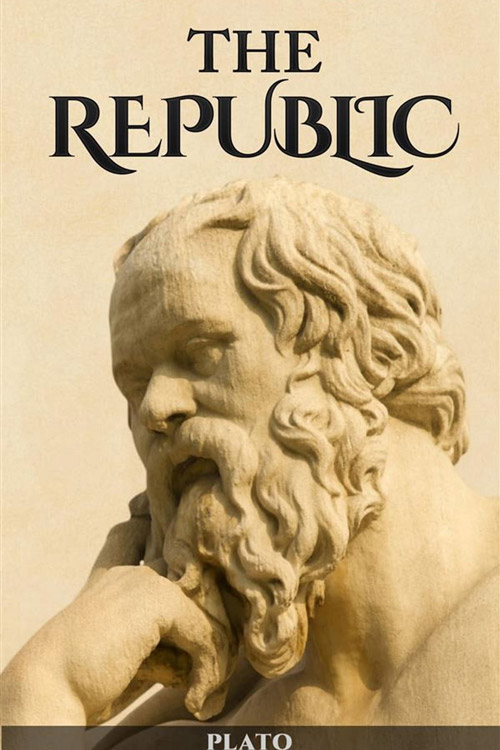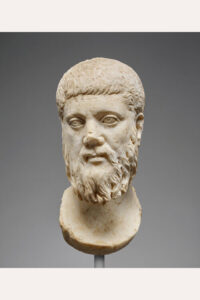
The Republic
Socrates suggests that they use the city as an image to seek how justice comes to be in the soul of an individual. After attributing the origin of society to the individual not being self-sufficient and having many needs that he cannot supply himself, Socrates first describes a “healthy state” made up of producers who make enough for a modest subsistence, but Glaucon considers this hardly different than “a city of pigs.” Socrates then describes the luxurious city, which he calls “a fevered state”. Acquiring and defending these luxuries requires a guardian class to wage wars. They then explore how to obtain guardians who will not become tyrants to the people they guard. Socrates proposes that they solve the problem with an education from their early years. He then prescribes the necessary education, beginning with the kind of stories appropriate for training guardians.
They conclude that stories that ascribe evil to the gods or heroes or portray the afterlife as evil are untrue and should not be taught. They also decide to regulate narrative and musical style to encourage the four cardinal virtues: wisdom, courage, justice, and temperance. Socrates avers that beautiful style and morally good style are the same. In proposing their program of censored education, they are repurifying the luxurious or feverish city. Socrates counters the objection that people raised in censorship will be too naive to judge concerning vice by arguing that adults can learn about vice once their character has been formed; before that, they are too impressionable to encounter vice without danger. They suggest that gymnastics should be the second part of the guardians’ education. Physical training allows them to live without needing frequent medical attention: physical exercise will help prevent illness and weakness. Socrates claims that any illness requiring constant medical attention is too unhealthy to be worth living. By analogy, any society requiring constant litigation is too harmful to maintain.
Socrates asserts that both male and female guardians be given the same education, that all wives and children be shared, and that they are prohibited from owning private property so that guardians will not become possessive and keep their focus on the good of the whole city. He adds a third-class distinction between auxiliaries (rank-and-file soldiers) and guardians (the city’s leaders). In the fictional tale known as the myth or parable of the metals, Socrates presents the Noble Lie (γενναῖον ψεῦδος, generation pseudos) to convince everyone in the city to perform their social role. All are born from the womb of their mother country, so all are siblings. Still, their natures are different, each containing either gold (guardians), silver (auxiliaries), or bronze or iron (producers). If anyone with a bronze or iron nature rules the city, it will be destroyed. Socrates claims that if the people believed “this myth…[it] would have a good effect, making them more inclined to care for the state and one another.” Socrates claims the city will be happiest if each citizen engages in the occupation that suits them best. If the city is happy, then individuals are so glad. In the physical education and diet of the guardians, the emphasis is on moderation since both poverty and excessive wealth will corrupt them (422a1). He argues that a city without wealth can defend itself successfully against wealthy aggressors.
Socrates says it is pointless to worry over specific laws, like those about contracts since proper education ensures lawful behaviour and poor education causes lawlessness (425a–425c). Socrates searches for wisdom, courage, and temperance in the city because justice will be more accessible to discern what remains (427e). They find wisdom among the guardian rulers, courage among the guardian warriors (or auxiliaries), and temperance among all city classes in agreeing about who should rule and who should be ruled. Finally, Socrates defines justice in the city as the state where each class performs only its work, not meddling in the work of the other classes (433b). The virtues discovered in the city are then sought in the individual soul. For this purpose, Socrates creates an analogy between the parts of the city and the soul (the city–soul analogy). He argues that psychological conflict points to a divided soul since a completely unified soul could not behave in opposite ways towards the same object, at the same time, and in the same respect (436b).
He gives examples of possible conflicts between the rational, spirited, and appetitive parts of the soul, corresponding to the city’s rulers, auxiliaries, and producing classes. Having established the tripartite soul, Socrates defines the virtues of the individual. A person is wise if he is ruled by the part of the soul that knows “what is beneficial for each part and for the whole,” courageous if his spirited part “preserves amid pleasures and pains” the decisions reached by the rational part, and temperate if the three parts agree that the sensible part lead (442c–d). They are just if each part of the soul attends to its function and not the function of another. It follows from this definition that one cannot be just if one does not have the other cardinal virtues. In this regard, Plato can be seen as a progenitor of the ‘social structures’ concept.
Read or download Book
Plato
Plato (Greek: Πλάτων Plátōn; 428/427 or 424/423 – 348 BC) was an ancient Greek philosopher born in Athens during the Classical period.
Biography
In Athens, Plato founded the Academy, a philosophical school where he taught the doctrines later known as Platonism. Plato, or Platon, was a pen name derived, apparently, from the nickname given to him by his wrestling coach – allegedly a reference to his physical girth. According to Alexander Polyhistor, quoted by Diogenes Laërtius, his actual name was Aristocles, son of Ariston, of the deme (suburb) Collytus in Athens. Plato was an innovator in the written dialogue and dialectic forms of philosophy. He raised problems for what became all the significant areas of both theoretical philosophy and practical philosophy. His most famous contribution is the theory of forms (or ideas), which has been interpreted as advancing a solution to what is now known as the problem of universals. He is the namesake of Platonic love and the Platonic solids.
His most decisive philosophical influences are usually thought to have been, along with Socrates, the pre-Socratics Pythagoras, Heraclitus, and Parmenides. However, few of his predecessors’ works remain extant, and much of what is known about these figures today derives from Plato himself. Along with his teacher, Socrates, and student, Aristotle, Plato is a central figure in the history of philosophy. Unlike his contemporaries, Plato’s entire body of work is believed to have survived intact for over 2,400 years. Although their popularity has fluctuated, Plato’s works have consistently been read and studied. Through Neoplatonism, Plato greatly influenced Christianity (e.g. Augustine of Hippo) and Islamic philosophy (e.g. Al-Farabi). In modern times, Alfred North Whitehead famously said: “The safest general characterization of the European philosophical tradition is that it consists of a series of footnotes to Plato. “Little is known about Plato’s early life and education. He belonged to an aristocratic and influential family. Based on ancient sources, modern scholars believe he was born in Athens or Aegina between 428 and 423 BC. The exact time and place of birth are unknown.
He was known to have worn earrings and fingerrings during his youth as a sign of his noble descent. The extent of Plato’s affinity for jewellery while young was even characterized as “decadent” by Sextus Empiricus. Plato gives little biographical information but refers at various points to some of his relatives with great precision, including his brothers, Adeimantus and Glaucon, in Plato’s Republic. These and other references make it possible to reconstruct Plato’s family tree. Plato may have travelled in Italy, Sicily, Egypt, and Cyrene. Still, at 40, Plato founded a school of philosophy in Athens, the Academy, on a plot of land in the Grove of Hecademus or Academus, named after Academus, an Attic hero in Greek mythology. The Academy operated until it was destroyed by Sulla in 84 BC. Many philosophers studied at the Academy, the most prominent being Aristotle. According to Diogenes Laertius, throughout his later life, Plato became entangled with the politics of the city of Syracuse, where he attempted to replace the tyrant Dionysius with Dionysius’s brother-in-law, Dion of Syracuse, whom Plato had recruited as one of his followers, but the tyrant himself turned against Plato. Plato almost faced death but was sold into slavery. Anniceris, a Cyrenaic philosopher, bought Plato’s freedom for twenty minutes and sent him home.
After Dionysius’s death, according to Plato’s Seventh Letter, Dion requested Plato return to Syracuse to tutor Dionysius II, who seemed to accept Plato’s teachings. Eventually, he becomes suspicious of their motives, expelling Dion and holding Plato against his will. Eventually, Plato left Syracuse, and Dion would return to overthrow Dionysius and rule Syracuse before being usurped by Callippus, a fellow disciple of Plato. A variety of sources have given accounts of Plato’s death. One story, based on a mutilated manuscript, suggests Plato died in his bed whilst a young Thracian girl played the flute to him. Another tradition suggests Plato died at a wedding feast. The account is based on Diogenes Laertius’s reference to an account by Hermippus, a third-century Alexandrian. According to Tertullian, Plato died in his sleep.






